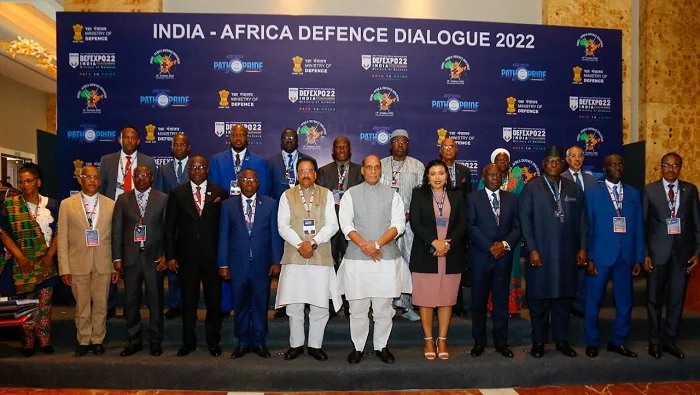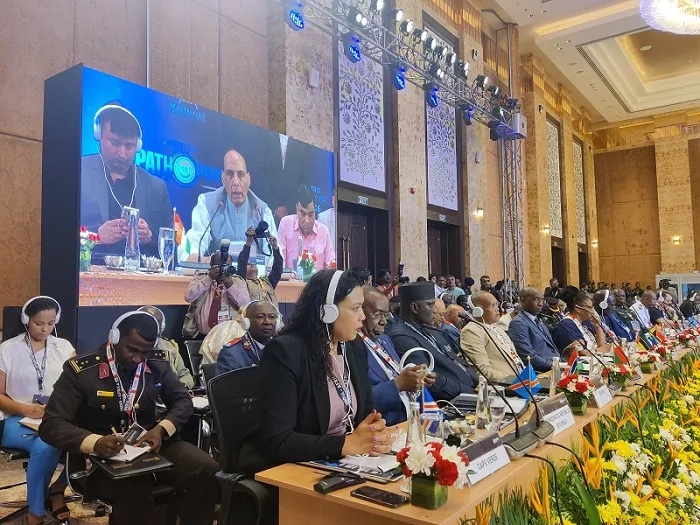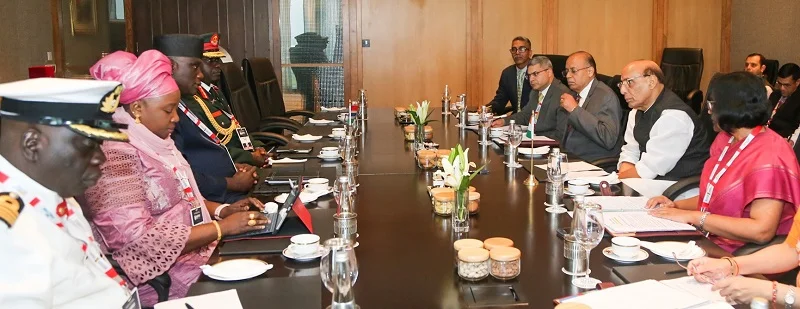Furthering the narrative of ‘Make in India, Make for the World’, India on Tuesday offered to fulfil the defence requirements of several African countries which continue to battle conflict, terrorism and violent extremism.
“A defence manufacturing ecosystem has been created in India which has the advantage of abundant technical manpower. Our defence industry can work with you to fulfil your defence requirements,” Defence Minister Rajnath Singh told his African counterparts at the India-Africa Defence Dialogue (IADD) held on the sidelines of DefExpo 2022 which kicked off in Gujarat’s Gandhinagar today.
As many as 50 African countries, including 20 Defence Ministers, seven CDS/Service Chiefs and eight Permanent Secretaries participated in the Dialogue showcasing the significance accorded to India-Africa engagement in defence and security.
Singh invited African countries to explore Indian defence equipment and technologies, stating that India has emerged as a leading defence exporter in recent years.
“Peace, security and development are interrelated. Security is essential for enabling development in the region. We have created a robust public and private defence industry,” he told the gathering of top African defence experts.

According to several UN Security Council reports, Islamic State in Iraq and the Levant (ISIL), also known as Daesh, has penetrated Africa since 2014 and is gaining strength with a significant footprint in multiple regions.
The UN Counter-Terrorism Committee Executive Directorate has detailed that key ISIL affiliates in West Africa are the Islamic State in the Greater Sahara (ISGS), present mainly in Burkina Faso, Mali and Niger, and the Islamic State West Africa Province (ISWAP), present mainly in Nigeria and the Lake Chad Basin region.
Increasing ISIL presence has also been recorded in Egypt, Libya, and Somalia.
While the Covid-19 pandemic has further exacerbated the threat posed by ISIL, it is believed that the success of the Taliban in Afghanistan may have also emboldened Al Qaeda-affiliated groups.
Like UN, India too believes that the trajectory of ISIL in Africa could have far-reaching implications for peace and security in the region and elsewhere. India, along with the African countries, is an important stakeholder in ensuring a safe and secure maritime environment, especially in the Indian Ocean Region (IOR).
Singh said on Tuesday that as India remains united with African countries in their quest for peace, security, stability, growth and prosperity, its partnership with Africa is centred on the 10 guiding principles articulated by Prime Minister Narendra Modi during his address to Parliament of Uganda in 2018.
“He had clearly stated that Africa will be at the top of our priorities. We will continue to intensify and deepen our engagements with Africa. Apart from the goals of developmental, commercial and technological partnerships that India wants to forge with African nations, the statement also covered cooperation in strengthening capabilities in combating terrorism and extremism, supporting UN peacekeeping missions and work for open and free oceans,” said the Defence Minister.

Describing the Indo-African ties as multi-faceted covering economic, diplomatic and defence domains, he also highlighted that India and Africa share a robust partnership which is based on the cooperative framework of ‘SAGAR’ (Security and Growth for All in the Region), drawn upon the ancient ethos of ‘Vasudhaiva Kutumbakam’ (The World is One Family).
India also spotlighted that it has been one of the strongest advocates of African decolonisation and has worked for the end of racist and apartheid regimes of the past.
The Indian Defence Ministry later stated that a ‘Gandhinagar Declaration’ was adopted as an outcome document of IADD 2022. It proposes to enhance cooperation in the field of training in all areas of mutual interest by increasing training slots and deputation of training teams, empowerment and capability building of the defence forces of Africa, participation in exercises and humanitarian assistance during natural disasters.
India has also offered fellowships for experts from African countries through Manohar Parrikar Institute for Defence Studies and Analysis.
Besides holding meetings with the Ministers of Defence from African countries, Singh also discussed the entire spectrum of defence cooperation with his Armenian and Maldivian counterparts Suren Papikyan and Mariya Ahmed Didi.
Also Read: India finds fault with UN terror report for ignoring Afghanistan as Islamic State hub




















